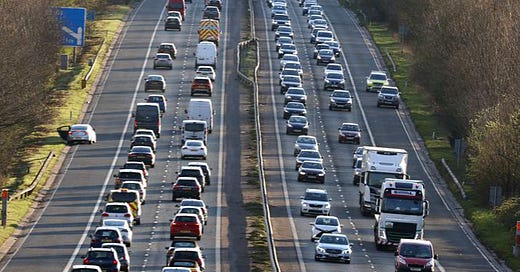An impossible target?
Disclosure time - the two of us behind this project don't drive. In what feels like a car dominated society, being non-drivers does make you see things in a very different way, trust us on that one! Pretty much everything we write about transport and planning is informed by the fact that we rely upon walking, trains and buses to get around.
Since moving down to Keynsham from Thurrock, we've become acutely aware of the many shortcomings of the train and bus services across the Avon region. We take back anything we've ever said about c2c who are the main train operator in the south of Essex. Compared to GWR, c2c shape up pretty well. Our experience of what passes for public transport across the region has clarified our understanding as to why there's a much greater reliance on cars as a means of transport. So, when we read this piece on Bristol Live, we did raise our eyebrows in disbelief: Car use across Bristol region needs to halve to meet net zero climate targets 22.3.23. Suffice to say, after reading this, there were guffaws of laughter!
To halve car use across the region by 2030 is pretty much an impossible task as things currently stand. Vast swathes of the region are not served by trains which in theory, could play a part in enticing people to leave their cars at home. The rail closures that took place in the 1960s have a lot to answer for. Sure, there are a few schemes for partial restoration of the lines that were axed and the stations that were closed but, they're going to take some time to complete. There has been years of talk and political posturing about the need for some kind of mass transit system across the region but little in the way of meaningful action.
You don't need us to tell you that what passes for a bus 'service' across the Avon region is an absolute joke. The rhetoric about people needing to use their cars less does not match the reality of there often not being a viable alternative because the buses are so unreliable.
Then there's the decades of planning policy which has assumed near universal car ownership. As a consequence, suburbs where car ownership is pretty much a necessity have been allowed to sprawl. Employment locations that can pretty much only be accessed by car have sprung up on the periphery of Bristol. A massive shopping centre with associated leisure venues, Cribbs Causeway, has been built right out by the M5. There are bus services running to Cribbs Causeway but the majority of people visiting drive because the buses aren't reliable. Then there's the YTL Arena which is going to be located on the site of the former airfield out in Filton. A venue that the majority of people attending will have no alternative but to travel to and from by car because what public transport provision there is would barely scratch the surface of the demand. A venue that was originally mooted to be sited near Temple Meads station before something inexplicable and possibly dodgy happened to scupper that.
We currently have to live with the consequences of the decades of planning policy assuming near universal car ownership. We're going to have to live with the consequences of planning decisions such as the go ahead for the YTL Arena at Filton that will act as a major traffic generator. People have been put into a position where all too often, they have no option but to drive. With the best will in the world, targets of reducing car use across the Avon region by half come 2030 are nigh on impossible as things currently stand. When people who feel that they have no option but to drive feel that they're being hectored into cutting down their car use when there are no viable alternatives, it's understandable that there's going to be anger and resistance. Even though we don't drive, we're not going to fall into the trap of guilt tripping people who have no option to using a car.
Setting aside all of the arguments about carbon emissions, the stark truth is that we live on a finite planet. At some point, the resources needed to maintain an economy and society based on hyper-mobility and the aim of continuous growth are going to start to run short. This is something we dealt with at some depth in this post: The future of movement on a finite planet 20.2.23. To adapt to that future will require a massive re-configuration of how we live our lives. It will certainly involve the application of holistic, joined up thinking, something which as things stand is in very short supply!
There are many barriers to having the deep, meaningful conversations about how we re-configure the way we live our lives to stay within the limits of a finite planet. The main barrier being the destructive system of late capitalism we live under at the moment. A system whose only answer to living within limits is to screw the vast majority of us into leading increasingly limited and monitored lives while the super rich continue to flaunt the wealth they've stolen from our graft. A system that has to be brought down and replaced by something saner, much more equitable and genuinely sustainable where power lies with the people at the grassroots in their communities.
So, we started off talking about the dire state of public transport across the region, decades of flawed planning decisions and unrealistic targets, and we've ended up advocating a revolution! The point is that when you look at the way things are at the moment, the trajectory we're on is unsustainable and things have to change, sooner rather than later. The system we live under is not run for our benefit, it's run for the super rich who have their own, very dark ideas about how to make life on this planet 'sustainable'. That's 'sustainable' for them and a grim existence for the rest of us! That's why radical change is vital so that we, the people, are the one's shaping a future that sustains us and the planet that supports us.






